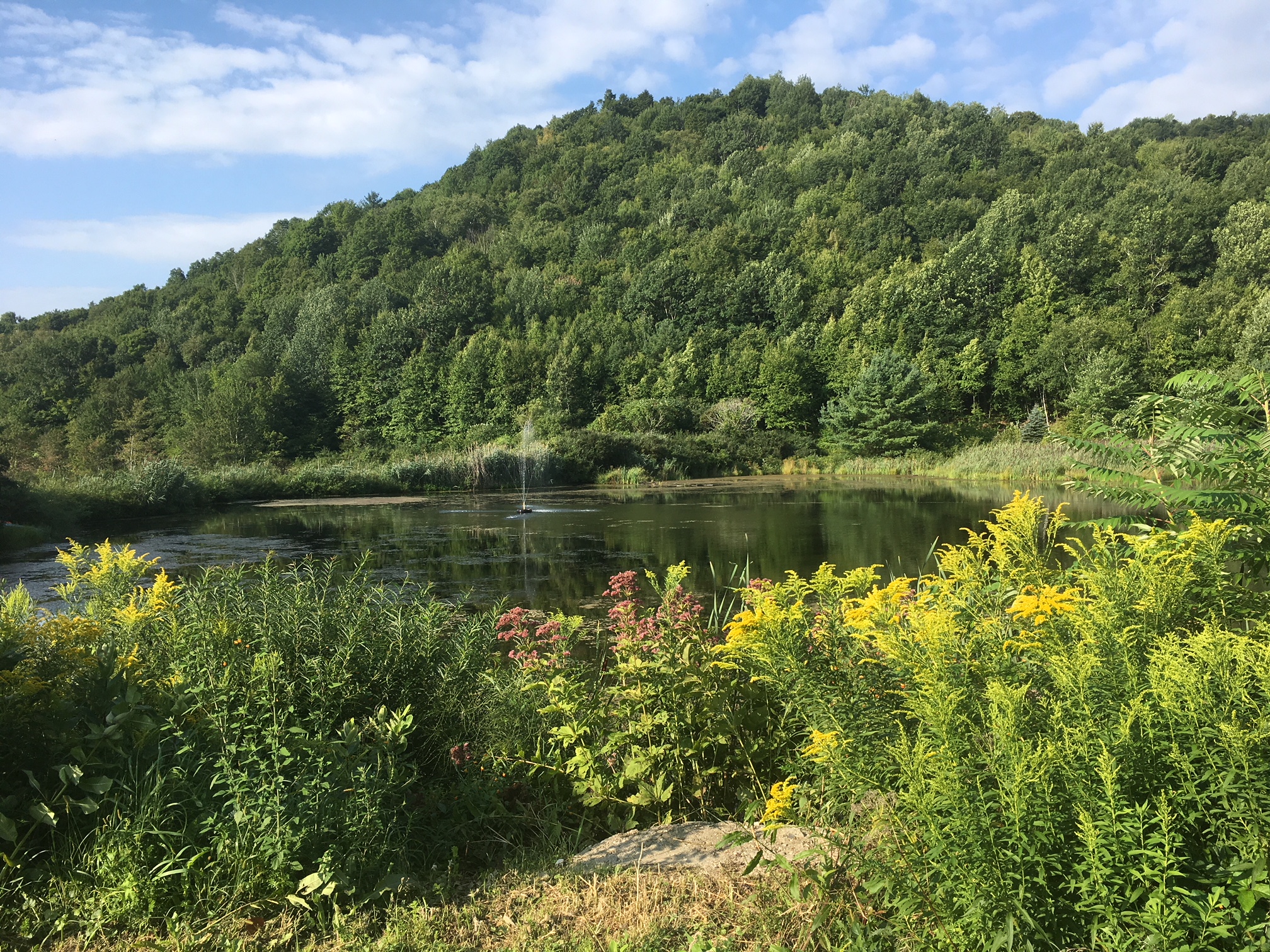Last week I was in the Catskills or the Berkshires or something, directing a week-long queer Jewish men’s retreat called Camp Nehirim. And leading up to Erev Shabbat we had the opportunity to do mikveh together – the tradition of immersion that often accompanies transformative moments.
Now the retreat center had a clean if glacially cold swimming pool where some guys chose to dunk. But others of us chose to immerse in a natural pond, also on the property, which was for sure mayim chayim, as they say. “Living water” – in this case evidenced by the thick layer of slippery algae growing on the rungs of the ladder from the dock.
I rarely get to have a mikveh experience, but I like it when I have it. Its seemingly simple symbolism. That somehow you enter shmutzik, and you emerge renewed, clean in some spiritual way. There is appeal in that. There is appeal in a ritual that doesn’t require all the rigors of whatever spiritual discipline you keep trying and failing at. It is bodily. It is sensory. It is automatic. It’s also the case that no matter how much you weren’t in the mood for it, mikveh does change you. You emerge refreshed, even if you can’t explain why.
The B’nai Yissaschar, one of the Chasidic rebbes of the old days, taught that this period of time that we are in now, from the beginning of the month of Elul through Yom Kippur, is in itself a mikveh, a mikveh in time. It is a beautiful idea, and he rustled up all sorts of dramatic mystical proofs for it, which I’ve shared in years past.
But you don’t need numerology or biblical quotes to feel the special quality of this period of time. How you enter it and emerge changed. You live enough years on this earth participating in the rhythm of Rosh Hashanah and Yom Kippur, and your body and your spirit already know to start being tenderized in these weeks leading up. Your body and your spirit know that there’s something deep and buoyant about these 40 days, like a body of water.
It is a sensitive time, an eyt ratzon as they say in Hebrew. It is a time when it is easy to feel the divinity around us, to feel ourselves afloat in Shechinah. It is an easy time to feel our overactive egos begin to give way, to dissolve into the fluidity of the mikveh. Even if we’re hanging onto our overactive egos for dear life, we know that before we emerge, we will have let go of them.
Tonight is the 22nd of Elul – the middle of this 40-day mikveh in time. This is the spot in the center of the pool where our feet can’t touch the bottom. So there’s no use trying. We must tread water, until we’re ready to dunk. And here we are, together, all dunking, just like the guys in the pond last week. I watched all their faces poking out of the surface of the water. There was laughter and giddiness. There were also tears. There was surprise at the depth and surprise at the temperature and surprise at how much we all needed to be right there in that moment.
We too need to be right here in this moment. Living in this Jewish rhythm of ours, trudging across the landscape of our lives, with all the wounds it inflicts, the hot sun and the rough ground and thorny brush underfoot. Our sore feet and aching shoulders from the burdens we all carry. We get to this time of year and see the pond, this mikveh in time, maybe we smell its freshness before we even see it. We shed our clothes, we shed our burdens, we are embraced by bracing cold living waters, where we are once again buoyant as we were in the womb. We dissolve into God. We dissolve into Nothingness. We dissolve into cells and then molecules and then atoms and then something subatomic – maybe Hebrew letters.
And as we become the water, we let go of all the solidity that has dominated us. We let go of what doesn’t serve us, what doesn’t – ultimately – mean anything. We open to a new possibility, to a new kind of future that our conscious minds haven’t yet considered. We reassemble, letter by letter, molecule by molecule, and we emerge, pruny and changed.
I’d like to say we emerge fresh and clean. But last week in the Berkshires or the Catskills, the 20 of us in the pond emerged to discover that we were coated in sludge. Dark pond scum stuck to all our body hair, and there were some very hairy Jewish men among us. We looked at each other and pointed and laughed. The symbolism of purification had gone so very wrong. We would now need to shower to clean off the mikveh.
But life should not be held to the high standards of symbolism. In our mikveh, in that pond, we stirred up deep stuff. And so in this period of time do we as well. Whatever we have let settle to the bottom – might become unsettled. We might stir up deep stuff in our neshomes. We might emerge from this mikveh in time feeling like a bit of a mess. And that’s just fine.
In this eyt ratzon, this tender period, it is important to be kind with ourselves. To laugh lovingly at the shmutz that we can’t seem to wash off, and to keep scrubbing.
Grateful to Reb Elliot Ginsburg for introducing me to the mikveh of Elul, and to the men of Camp Nehirim for teaching me many lessons.
